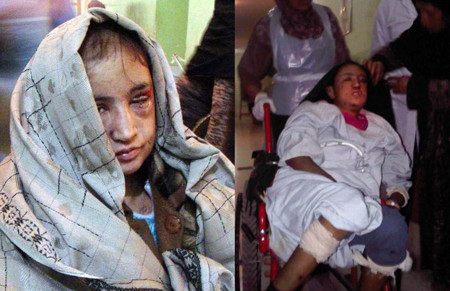(Kabul) – Afghanistan’s lower house of parliament, the Wolesi Jirga, should reject a proposed criminal law revision that would effectively deny women legal protection from domestic violence, Human Rights Watch said today. A new draft of the criminal procedure code, seen by Human Rights Watch, is currently being considered by Afghanistan’s parliament.
The proposed language would prohibit the relatives of a criminal defendant from being questioned as a witness against the accused. Should this provision become law, victims and other family members who have been witnesses to abuse will be silenced in domestic violence cases, making successful prosecutions unlikely.
“Afghanistan’s lower house is proposing to protect the batterers of women and girls from criminal punishment,” said Brad Adams, Asia director. “Legislative approval of this criminal law revision would effectively stop prosecutions of people who beat, forcibly marry, and even sell their female relatives.”
Article 26 of the draft law, entitled “Forbiddance of Questioning an Individual as a Witness,” states that “The following people cannot be questioned as a witness: … 4) Relatives of the accused person.” The amended procedure code would pose a serious threat to critical protections for women and girls embodied in Afghanistan’s groundbreaking Law on Elimination of Violence Against Women (the EVAW Law), passed by presidential decree in 2009. The EVAW law provides criminal penalties for various abuses including rape, child marriage, forced marriage, domestic violence, sale of women and girls, and baad, the giving of girls to resolve disputes between families.
The proposed ban on testifying against relatives follows several other efforts by the Wolesi Jirga to further weaken the inadequate legal protections for women’s rights, Human Rights Watch said. Members of parliament opposed to women’s rights have increasingly sought to repeal or weaken the EVAW Law. A Wolesi Jirga debate over the EVAW Law in May 2013 was halted after 15 minutes when parliamentarians called for revisions that would have eliminated the minimum marriage age for girls, abolished shelters, and ended criminal penalties for rape and domestic violence. Although the EVAW law has been slowly and unevenly enforced, it has been a crucial tool for fighting violence against women.

Sahar Gul, a 15-year old girl brutally tortured by her in-laws for refusing prostitution. (Photo: RFE/RL)
In May, the Wolesi Jirga passed a revision of Afghanistan’s Electoral Law that deleted an existing guarantee reserving at least 25 percent of seats in each of Afghanistan’s 34 provincial councils for female candidates. The new version of the law provided no set-aside provincial council seats for women. The upper house of parliament, the Meshrano Jirga, subsequently reinstated the set-aside for women on provincial councils. On July 15, Afghanistan’s Tolo News reported that the two houses had agreed upon a version of the law that reduces the set-aside to 20 percent.
“It’s perverse that Afghanistan’s parliament is devoting its time and energies to attacking women’s hard-fought legal protections,” Adams said. “The international donors who bankroll the Afghan government should serve notice that they will not underwrite legislative initiatives to victimize women.”
The legislative threat emerging from the Wolesi Jirga coincides with other recent developments that indicate a broad-based attack on women’s rights which the government has contributed to, rather than opposed:
President Hamid Karzai appointed to the Afghanistan Independent Human Rights Commission (AIHRC) a former Taliban government official, Abdul Rahman Hotak, who publicly denounced the EVAW Law. Hotak was quoted in the New York Times on July 1 saying, “The people who have written that law do not know Afghanistan and Afghan society very well – perhaps they think Kabul is Afghanistan.” The same week he told Reuters that in his view the EVAW Law is “violating Islam” and there should be a law that people are “comfortable” with.
Another ominous sign of the ongoing rollback in women’s rights in Afghanistan was the decision in early July by an appeals court to release three family members convicted for the torture and starvation of a teenage in-law, Sahar Gul, after serving only about a year of a 10-year sentence for her attempted murder. In 2011, Sahar Gul’s stepbrother sold her for US$5000 to be forcibly married. She was about age 13 or 14 at the time. According to media reports, soon after the marriage her in-laws attempted to force Sahar Gul into prostitution. When she resisted, the in-laws locked her in the basement of their house for months, burned her, pulled out her fingernails and pinched her with pliers. She was found in December 2011 locked in the basement, badly malnourished. The appeals court reversed the sentence and instead ordered the release of Gul’s mother-in-law, father-in-law, and sister-in-law for lack of evidence of attempted murder.
On July 3, unidentified assailants shot and killed Islam Bibi, the most senior female police officer in insecure Helmand province, on her way to work. The murder highlighted the risks to women in public life and the Afghan government’s failure to protect women under threat.
The escalating setbacks to women’s rights have not deterred the Afghan government from trying to put a positive spin on recent developments, Human Rights Watch said. On July 10, an Afghan delegation at the United Nations in Geneva for the first review of Afghanistan’s compliance with the Convention on the Elimination of All Forms of Discrimination against Women (CEDAW), assured the Committee on the Elimination of Discrimination against Women that the Afghan government is fully committed to implementing CEDAW and to promoting women’s rights.
“While Afghan officials give lip service to women’s rights at the UN, the president, parliament and courts are actively undermining those rights,” Adams said. “Afghanistan’s foreign donors should be loud and clear that they won’t stand by while Afghan women’s hard-won rights are swept away.”



